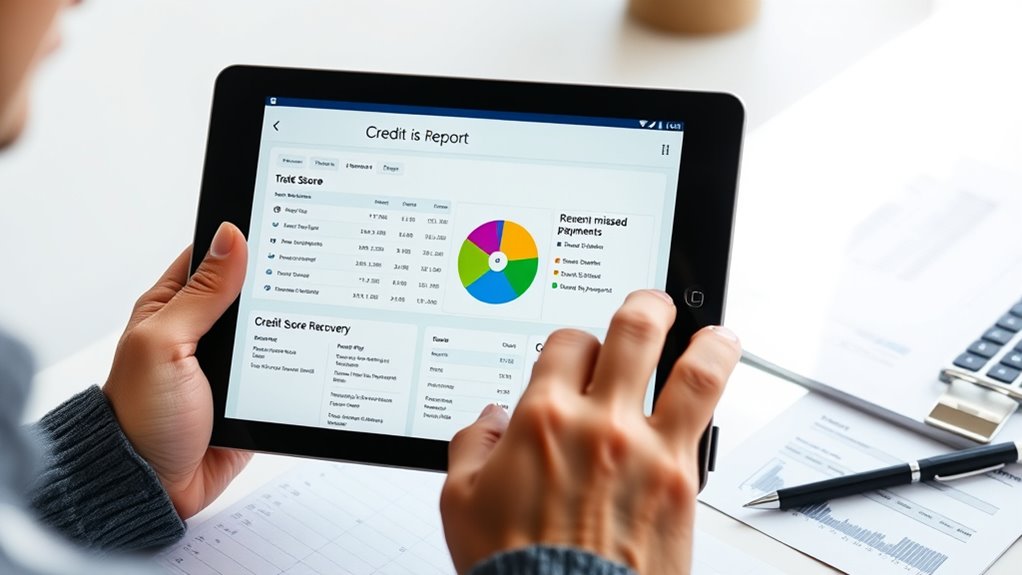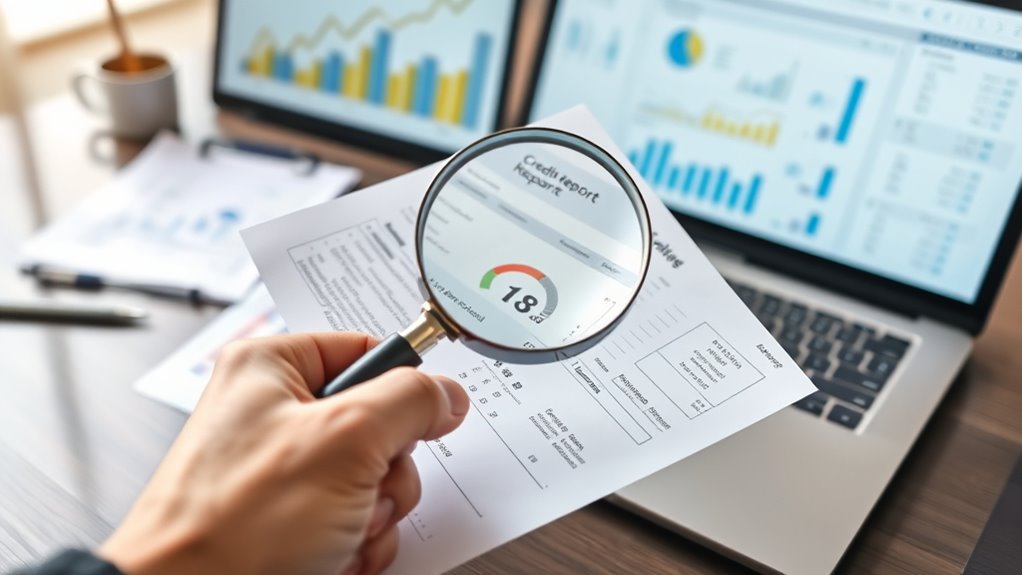To recover your credit score after missed payments, start by reviewing your credit reports for errors and understanding how missed payments affect your score. Contact lenders to catch up on overdue accounts, and create a budget to avoid future late payments. Keep your credit utilization low and dispute inaccuracies. Seeking professional help may speed up improvement. Keep up with good habits, and you’ll uncover more effective strategies to rebuild your credit over time.
Key Takeaways
- Review credit reports from all bureaus to identify and dispute inaccuracies or outdated information affecting your score.
- Contact lenders promptly to arrange payment plans or negotiate forbearance on missed payments.
- Keep credit utilization low (under 30%) by paying down balances and spreading expenses across multiple cards.
- Make all payments on time moving forward, ideally setting up automatic payments to prevent further late fees.
- Consider professional credit repair services for personalized strategies to correct errors and accelerate score recovery.
Assess Your Credit Report and Identify Missed Payments

To begin repairing your credit score, you need to review your credit report carefully. Obtain a copy from all three major credit bureaus—Equifax, Experian, and TransUnion—and look for any missed payments or inaccuracies. Pay close attention to your payment history, as missed or late payments can profoundly impact your score. Highlight any discrepancies, such as accounts you don’t recognize or outdated information. Make note of the dates and amounts involved in missed payments. This review helps you understand where your credit stands and pinpoints specific issues to address. Being thorough now ensures you won’t overlook errors or missed payments that could be harming your score. It’s the essential first step toward improving your credit health. Additionally, understanding the types of credit, such as credit cards, loans, or other accounts, can help you strategize your recovery plan more effectively.
Understand How Missed Payments Impact Your Credit Score

Understanding how missed payments affect your credit score is vital after reviewing your report. Missed payments can substantially lower your score, especially if they’re recent or persistent. Here’s what you need to know:
- Payment history accounts for about 35% of your score, so missed payments heavily influence your rating. Regularly monitoring your credit report can help identify issues early and prevent further damage.
- The impact is more severe in the first few months after a missed payment, but it can linger for up to seven years.
- Repeated missed payments signal higher risk to lenders, making it harder to qualify for new credit or secure favorable rates.
- Recognizing patterns of financial behavior can be crucial in understanding the long-term effects of trust issues in relationships, which mirror the importance of trust in managing credit. Additionally, understanding how credit scoring models evaluate late payments can help you better interpret your report. Being aware of the credit reporting timeline can also help set realistic expectations for how long missed payments remain visible.
- Improving your credit after missed payments involves consistent responsible behavior, which can gradually restore your credit score over time. While one missed payment isn’t the end of the world, understanding these effects helps you make smarter decisions to recover faster. Staying proactive is key to rebuilding your credit health.
Take Immediate Steps to Bring Accounts Current

When you realize an account is overdue, taking immediate action can prevent further damage and start the recovery process. Contact your lender or creditor as soon as possible to explain your situation. Often, they’re willing to work out a payment plan or offer a temporary forbearance. Check your current balances and gather any necessary documentation to support your case. Make a budget to prioritize catching up on missed payments and avoid additional late fees. If you can’t pay the full amount, ask if partial payments are acceptable. Staying proactive shows your commitment to resolving the issue. The sooner you act, the better your chances of minimizing damage to your credit score and setting the stage for recovery. Understanding how a home theatre projector’s contrast ratio impacts image quality can help you better evaluate your options for visual displays during your recovery period. Keeping a credit report regularly updated can help you monitor your progress and identify any discrepancies early on. Additionally, familiarizing yourself with testing tools like JIRA or Selenium can improve your approach to managing and verifying your financial recovery steps. Incorporating remote work strategies such as flexible scheduling can also help you stay organized and reduce stress during this time. Being aware of credit scoring models can provide insights into how your actions influence your credit recovery trajectory.
Establish a Consistent Payment History Moving Forward

Once you’ve addressed your overdue accounts, the next step is to build a steady payment pattern. Consistency shows lenders you’re reliable, which helps improve your credit score over time. To establish this, focus on these key actions:
- Make all payments on time, every month, without exception.
- Set up automatic payments to avoid missed due dates.
- Keep your bills organized to ensure timely payments and prevent oversight.
- Regularly review your credit report to monitor your progress and identify areas for improvement credit report.
- Developing a consistent payment history demonstrates your reliability and can significantly boost your credit score over time. Additionally, practicing financial discipline by avoiding unnecessary debts can further strengthen your credit profile and support long-term financial health, especially when combined with maintaining a good payment record.
Reduce Your Credit Utilization Ratio

Reducing your credit utilization ratio is essential because it directly impacts your credit score. This ratio compares your current credit card balances to your total available credit limits. The lower your utilization, the better it signals to lenders that you’re responsible with credit. To improve this, aim to keep your balances below 30% of your credit limits, ideally under 10%. You can do this by paying down existing balances, requesting higher credit limits, or spreading expenses across multiple cards. Avoid maxing out your credit cards, as high balances hurt your score. Regularly monitor your accounts to stay aware of your utilization. Consistently maintaining a low ratio shows lenders you’re a reliable borrower, which helps boost your credit score over time.
Dispute Errors and Inaccuracies on Your Credit Report

After lowering your credit utilization ratio, it’s important to verify your credit report accurately reflects your financial behavior. Errors and inaccuracies can hurt your score, so review your report carefully. If you find mistakes, take these steps:
After reducing your credit utilization, review your report for errors to protect and improve your credit score.
- Identify incorrect details, such as wrong account balances, outdated information, or unfamiliar accounts.
- Gather supporting documentation that proves the error, like statements or payment records.
- File a dispute with the credit bureaus via their online platforms or written letters, clearly explaining the issue and attaching evidence.
Disputing errors is essential because correcting inaccuracies can quickly boost your score. Regularly reviewing your report helps catch mistakes early, ensuring your credit profile remains accurate and healthy.
Consider Professional Help and Credit Repair Strategies

If you’re feeling overwhelmed by the process of improving your credit score, considering professional help or credit repair strategies can be a smart move. These options can guide you through complex steps, saving you time and stress. Think of credit repair like tending a garden: it requires patience, knowledge, and consistent effort. To visualize, imagine this table:
| Step | Action | Outcome |
|---|---|---|
| Assess Your Credit | Obtain reports, identify issues | Clear picture of your credit health |
| Dispute Errors | Correct inaccuracies | Improved score, fewer mistakes |
| Negotiate Payments | Settle debts or arrange plans | Reduced debt, better history |
| Seek Professional Help | Hire credit repair services | Expert guidance, faster results |
| Maintain Good Habits | Keep paying on time, reduce debt | Long-term credit stability |
Professional help simplifies the journey, making recovery more manageable. Additionally, understanding credit bureaus and their reporting processes can further enhance your efforts.
Frequently Asked Questions
How Long Does It Take to Fully Recover a Credit Score After Missed Payments?
You’re curious about how long it takes to fully recover your credit score after missed payments. Generally, it can take several months to a few years, depending on your overall credit history and how quickly you address the issues. Consistently making on-time payments, reducing debt, and avoiding new missed payments help speed up recovery. Keep in mind, negative marks stay on your report for up to seven years but lessen in impact over time.
Can Making On-Time Payments After Missed Ones Significantly Speed up Recovery?
Making on-time payments after missed ones can markedly speed up your credit recovery. When you consistently pay on time, it shows lenders you’re reliable, which helps improve your score faster. Your payment history has a strong impact, so staying current and avoiding further missed payments demonstrates positive behavior. Over time, this proactive approach rebuilds your creditworthiness, and your score gradually rises as your timely payments become the norm.
Do Different Types of Missed Payments Affect My Credit Score Differently?
When you’re wondering if different missed payments hit your score differently, it’s like comparing apples and oranges. Not all missed payments are equal; a late mortgage payment might hurt more than a missed cell phone bill. Generally, the more recent and severe the missed payment, the bigger the blow to your score. Staying consistent and addressing any missed payments promptly can help you smooth out the bumps in your credit journey.
How Do Closed Accounts With Missed Payments Impact My Credit Recovery Process?
Closed accounts with missed payments can still impact your credit recovery. They stay on your report for up to 7 years, showing your payment history. While closing an account might reduce your overall available credit, missed payments on closed accounts can lower your score and make recovery slower. To improve, focus on paying current debts on time, and avoid new missed payments, which will help your score gradually rebound over time.
Are There Specific Credit Products That Can Help Rebuild Credit Faster?
You can rebuild your credit faster by choosing specific credit products like secured credit cards and credit-builder loans. Secured cards require a deposit, which reduces risk and helps establish or rebuild positive credit history. Credit-builder loans are designed to help you make regular payments, boosting your score over time. Using these products responsibly, paying on time, and keeping balances low will accelerate your credit recovery.
Conclusion
Recovering your credit score after missed payments is possible if you stay proactive. Regularly reviewing your report, correcting errors, and maintaining consistent payments truly make a difference. Some believe that one missed payment permanently ruins your score, but studies show recovery is achievable within months, proving that diligent effort outweighs past mistakes. Stay committed, and you’ll rebuild your credit—it’s not just a myth, but a proven fact.









